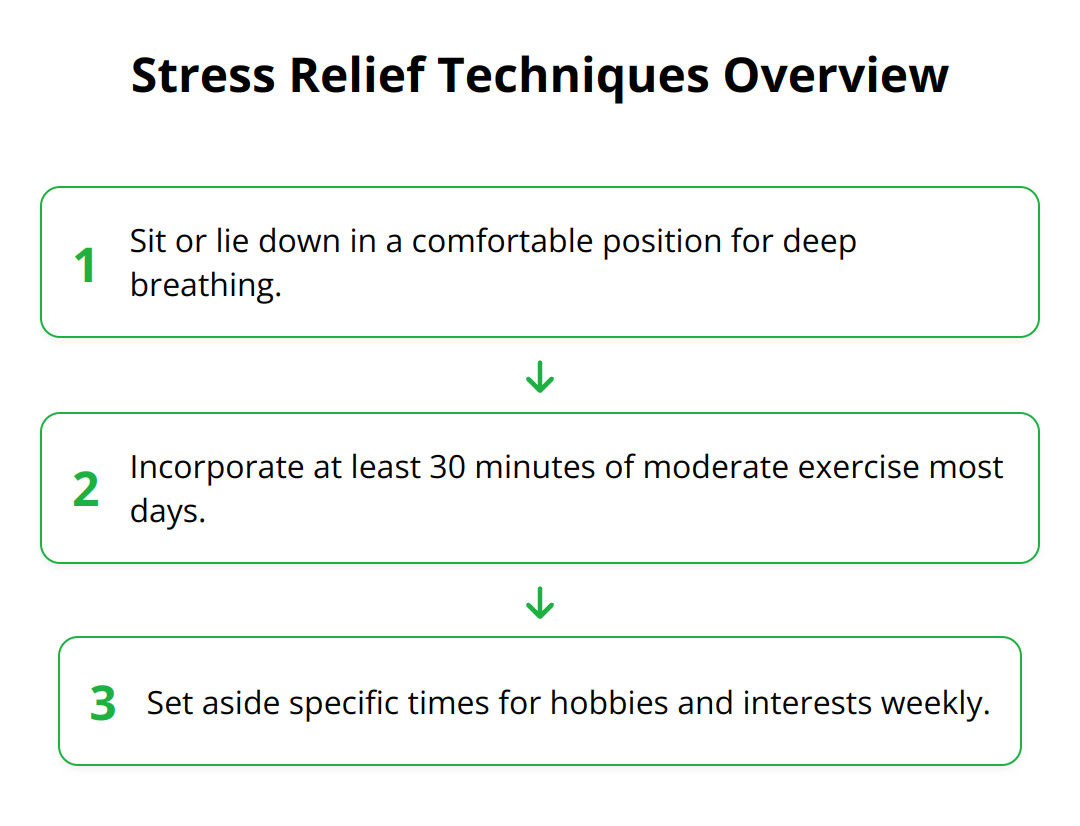Stress is an inevitable part of life, influencing our health and well-being more than we often realize. Recognizing its impact is the first step towards managing it effectively. We at Pure Hemp Essentials believe in providing practical strategies to help mitigate stress. This guide aims to arm you with tools and techniques to navigate stress with confidence.
Understanding Stress
Stress is more than just a buzzword; it’s a physical and emotional response to pressures from the outside world. Ignoring stress can lead to serious health issues, both mentally and physically. Recognizing the signs and effects of stress is essential to take proactive measures for managing it effectively.
Stress manifests through a variety of symptoms, including but not limited to insomnia, irritability, anxiety, and physical complaints like headaches or stomachaches. It’s crucial to listen to your body and take these signs seriously. In the hustle of daily life, these symptoms may seem trivial, but they are your body’s way of signaling overload.
Physical effects of stress include elevated blood pressure, increased heart rate, and a weakened immune system. These can lead to more serious health problems if not addressed. On the emotional side, stress can cause feelings of despair, a lack of motivation, and even depression. The key is not to let stress spiral out of control but to find effective ways to manage it.

For those looking to mitigate stress, consider incorporating these tried and tested strategies into your routine:
-
Exercise regularly: Physical activity is a proven stress reducer. It doesn’t have to be intense; even a daily walk can make a difference.
-
Eat a balanced diet: Nutrition plays a crucial role in managing stress. Foods rich in vitamins and minerals can help combat stress levels.
-
Get enough sleep: Never underestimate the power of a good night’s rest. Sleep rejuvenates the body and mind, making you better equipped to handle stress.
-
Practice mindfulness: Techniques such as meditation, deep breathing, and yoga can significantly lower stress levels and improve your overall well-being.

It’s also beneficial to explore natural aids for stress relief. Products like CBD have been recognized for their potential to assist in managing anxiety and stress. Research on CBD’s effects is ongoing, but many find it a helpful addition to their stress management toolkit. For more detailed information on how CBD can help, consider visiting managing anxiety naturally and CBD herbal supplements.
Understanding stress and its effects is a vital step in taking back control of your health and well-being. Remember, recognizing the signs of stress allows you to take action before it overwhelms you. Incorporate these strategies into your life for a more balanced and stress-free existence.
Practical Stress Relief Techniques
When it comes to managing stress effectively, practical steps can make a significant impact. Incorporating simple, yet effective techniques into your daily routine can greatly decrease stress levels and enhance your quality of life. Here are specific strategies to help you relieve stress.
Deep Breathing for Immediate Calm
The power of deep breathing exercises cannot be overstated. It’s a direct route to calming the nervous system and can be done anywhere, anytime. Start by sitting or lying down in a comfortable position. Close your eyes, breathe in deeply through your nose, allowing your stomach to rise. Hold your breath for a few seconds, then slowly exhale through your mouth. Repeat this process for a few minutes. Consistency is key, and practicing deep breathing for just 5-10 minutes daily can significantly reduce stress.

Physical Activity as a Stress Buster
Engaging in physical activity is one of the most effective ways to combat stress. It’s not about intensive workouts but finding joy in movement. Incorporate activities you love into your day. Whether it’s a brisk walk, yoga, dancing, or cycling, moving your body releases endorphins, which are nature’s stress relievers. Aim for at least 30 minutes of moderate exercise most days of the week. For those who spend a lot of time at a desk, take short breaks throughout the day to stretch or walk around.
Prioritizing Hobbies and Interests
Making time for hobbies and interests is vital for mental health. It’s easy to get caught up in responsibilities and forget about activities that bring joy. Whether it’s reading, painting, cooking, or gardening, engaging in hobbies helps distract the mind from stressors, providing a sense of accomplishment and relaxation. Set aside specific times in your week dedicated solely to these interests. This not only gives you something to look forward to but also helps balance out the stress of day-to-day life.
Quick Tips:
-
Practice deep breathing daily.
-
Find a physical activity you enjoy and make it a regular part of your routine.
-
Schedule time for hobbies and interests to ensure you follow through.

Adopting these practical stress relief techniques can lead to significant improvements in your overall well-being. Remember, managing stress is about building a toolkit of strategies that work for you—experiment and find the combination that brings you the most balance and peace.
Establishing a Supportive Environment
In the journey towards stress management, creating a supportive environment plays a pivotal role. It’s about fostering spaces and relationships that encourage relaxation and resilience against stress. Focus on building meaningful connections, crafting a stress-reducing living space, and understanding when professional assistance might be beneficial.
Building Meaningful Connections
Never underestimate the power of a solid support system. Meaningful connections with friends, family, or supportive communities can act as a buffer against stress. These relationships provide comfort, advice, and a listening ear when needed. Prioritize spending quality time with loved ones, whether it’s a simple coffee catch-up or a weekend getaway. For those feeling isolated, consider joining interest-based groups or online communities to foster new connections. A strong network not only enriches your life but also strengthens your ability to manage stress.
Creating a Stress-Free Living Space
Your living environment has a direct impact on your stress levels. Clutter, disorganization, and a lack of personal touch can escalate stress. Aim for a clean, organized, and personal space that reflects tranquility and comfort. Integrate elements like plants, which are known to reduce stress and improve air quality. Pay attention to lighting; natural light boosts mood and energy, whereas warm, soft lighting can help relax in the evening. Investing time and effort into creating a peaceful living space goes a long way in reducing daily stress. For tips on optimizing your home for stress relief, explore our insights on enhancing your focus with CBD.
Seeking Professional Help When Needed
Despite our best efforts, there are times when stress becomes overwhelming, and self-help strategies might not suffice. Recognizing the need for professional help is a sign of strength, not weakness. Whether it’s therapy, counseling, or speaking to a GP about stress management options, professional guidance can provide tailored strategies and support. Early intervention can prevent stress from escalating into more serious health issues.

In conclusion, establishing a supportive environment encompasses nurturing relationships, creating a calming living space, and being open to seeking help when necessary. These practical steps collectively contribute to managing stress effectively, paving the way for a more balanced and fulfilling life.
Following these actionable steps creates a foundation for better stress management. Each element, from personal connections to the atmosphere of your living space, works together to build resilience against stress, ensuring that you have the tools and support necessary to navigate life’s challenges.
Wrapping Up
In our journey to manage stress efficiently, we’ve explored a range of practical strategies that can make a real difference in our daily lives. From the simplicity of deep breathing for immediate calm to the joy and endorphin release provided by regular physical activity, each technique offers a stepping stone toward a more manageable, stress-free life. Prioritizing hobbies and interests emerges as an essential element, serving not only as a distraction but as a meaningful engagement that nurtures our well-being.

The importance of consistent practice cannot be overstated. Incorporating these stress relief techniques into our routine is not a one-time effort but a continuous commitment to our mental health. With dedication, we can cultivate a life that balances the inevitable stresses with moments of peace and relaxation.
We encourage you to always prioritize your mental health. Remember, the strength to manage stress comes from within, supported by the tools and techniques we choose to adopt. Among these tools, we at Pure Hemp Essentials offer a range of products designed to support your journey toward better health and wellness. Including CBD products in your stress management toolkit can provide an additional layer of relief and tranquility. Discover our Hempworx CBD collection today, featuring everything from oils and skincare to wellness products that cater to a wide array of needs.
Managing stress is an integral part of living a fulfilling and healthy life. By embracing these stress relief techniques and making them a part of your everyday life, you’re taking important steps to improve not only your mental health but your overall life quality. Let’s continue to build on these practices, remaining patient and compassionate with ourselves as we navigate the complexities of life. With the right tools and a commitment to ourselves, we can face stress with confidence and grace.
